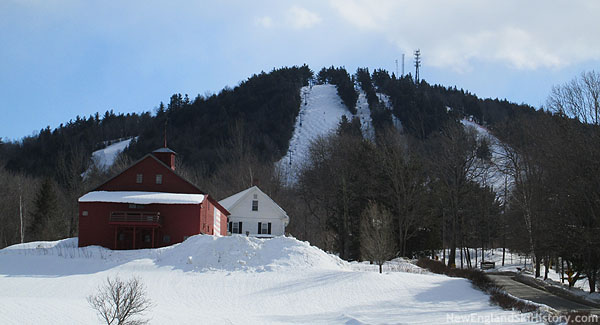
|
|
Located on the northeast face of Craney Hill in Henniker, New Hampshire, Pats Peak is one of southern New Hampshire's most popular ski areas. While many areas large and small have come and gone in the region over the past half century plus, Pats Peak has been able to gradually improve its facilities, attributing much of its success to a business model that avoids debt whenever possible.
Early Years
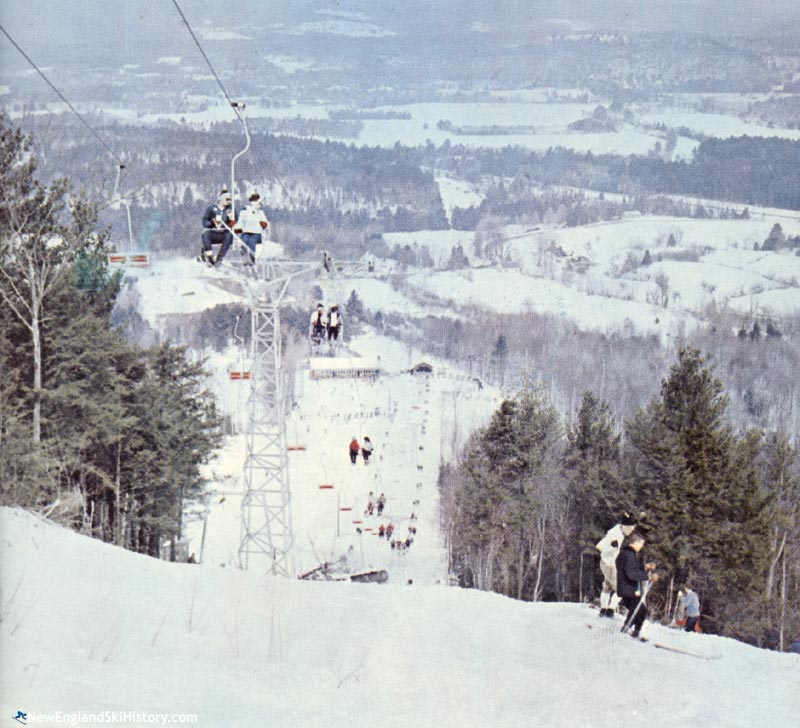
The Peak Double circa the early 1960s |
The roots of Pats Peak date back to circa 1961, when Dave Patenaude began thinking about building a small ski area on the side of Craney Hill. After his brother Joe joined the project, plans were expanded an additional land was procured. The development soon became a family affair, as their brother Stuart and father Merle joined the do-it-yourself effort to keep costs down. According to the Concord Monitor, Merle was responsible for building the base lodge, Joe helped with carpentry and trail cutting, Stuart was "the mechanical one" involved in lift construction, and Wayne handled the well drilling with his Contoocook Artesian Well Company.
Four trails and two slopes, spanning 613 vertical feet, were cleared with some of the resulting timber used for constructing a 30 foot by 80 foot lodge uphill from the present day base area. Henry Crowninshield Jr. was hired as business manager.
Merle later discussed his sons' efforts with the Concord Monitor, stating, "This is just what they did. They laid out their own trails, did their own surveying and cutting. They installed the steel towers needed for the chairlift and T-Bars. They ran the bulldozers, graded, back filed [sic] - performed every construction job there was until it was built."
Pat's Peak, Inc. was incorporated on December 20, 1962 by attorneys John Barto and Ronald Snow and Loralee Jackson. Merle Patenaude Jr. (Joe) was treasurer, while David Patenaude and Stuart Patenaude served as directors.
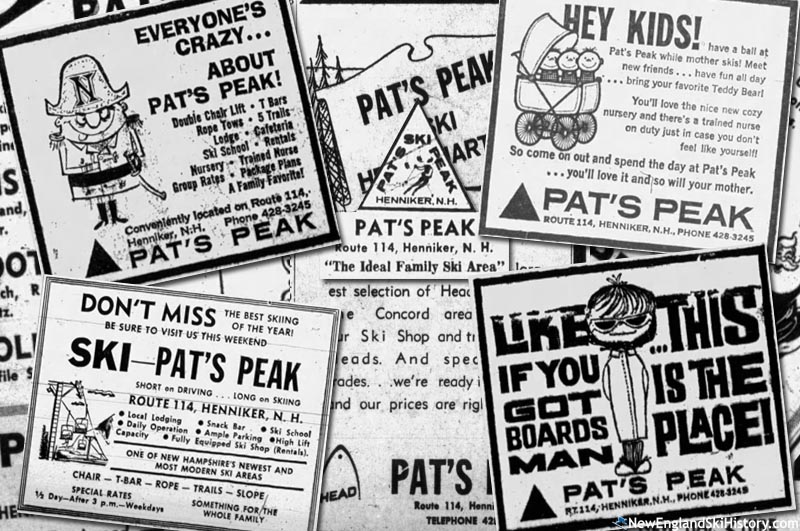
1960s Pat's Peak Ads |
Pat's Peak ski area opened on January 5, 1963 on a thin natural snow base with a T-Bar and rope tow. Night skiing was available on a semi-private basis. Two weeks later, the double chairlift to the summit debuted. Bill Coolidge's A. W. Coolidge Ski Schools, Inc. operated the ski school, which had plenty of business as Pat's Peak quickly cultivated its regional school programs. Snowpack was reportedly scant until mid-February, as Pat's Peak billed itself as "short on driving, long on skiing." The season likely lasted until late March or early April, when warm rain arrived.
That off-season, Pat's Peak held numerous events, such as an Easter church service, cook outs, and at least one wedding.
In July, the ski area acquired land from David and Merle Patenaude as expansion plans were developed. The main part of the $50,000 expansion was the new novice Valley area, served by a 1,900 foot T-Bar. A 325 foot rope tow was constructed between the lodge and the parking lot, designated as a "courtesy tow" to help skiers get to the lodge. The ski shop was expanded and leveraged a franchise agreement for Head skis. On the main mountain, the novice Breeze trail was constructed, while Duster was reclassified as intermediate. Ralph Amsden was named area manager. A World War II era Navy veteran, Amsden had previously worked at Carroll Reed Ski Shop and Mt. Whittier.
The 1963-64 season got underway in mid-December with the original T-Bar operating, as snowpack was insufficient to ski the main mountain or new novice slope at the time.
In February, Pat's Peak made headlines when power was lost during peak time on a Saturday. After shutting down the ski area, it was discovered that hunters had shot the main electric line in three different places.
Following the 1963-64 season, area manager Ralph Amsden departed to manage the new Mt. Agamenticus ski area in southern Maine.
A children's nursery was likely added for the 1964-65 season. Douglas Nelson likely served as director of the A. W. Coolidge Ski School. The season likely had an early December opening, thanks to natural snowfall. Snow was meager thereafter, as the area only had a base of 0 to 3 inches by mid-January. Nevertheless, the season managed to last into the beginning of April.
The 1965-66 season had another slow start, as January saw some missed operating days and weeks of reports of bare spots with scant base. Shortly after the newly formed Pat's Peak Ski Club (co-founded by Harvey and Sandy Chandler) held a sanctioned race, an end of the month storm gave the season a significant boost. Warm rain threatened the Washington's Birthday weekend, however a few inches of snow fell just in time to preserve operations. The New England College Winter Carnival continued to build, as the 1966 festivities started when Governor John King lit a torch in Concord, which was then run to Pat's Peak to start a fireworks display and torchlight ski run.
The 1965-66 season likely ended at the end of calendar winter, with business improving over the previous season.
During the 1966 off-season, Pat's Peak hosted dancing to live music on Saturday nights.
Improvements were made to the base lodge and slopes for the 1966-67 season. The seven trail, three slope trail network continued to be served by the chairlift, two T-Bars, and two rope tows. A modest snowstorm allowed the ski area to open on December 15 with limited terrain. Snow was plentiful that winter, as base depths grew to 2 to 3 feet by mid-March.
An early season snow storm allowed the 1967-68 season to start in mid-November on limited terrain. The season likely ended in mid to late March.
New Base Area
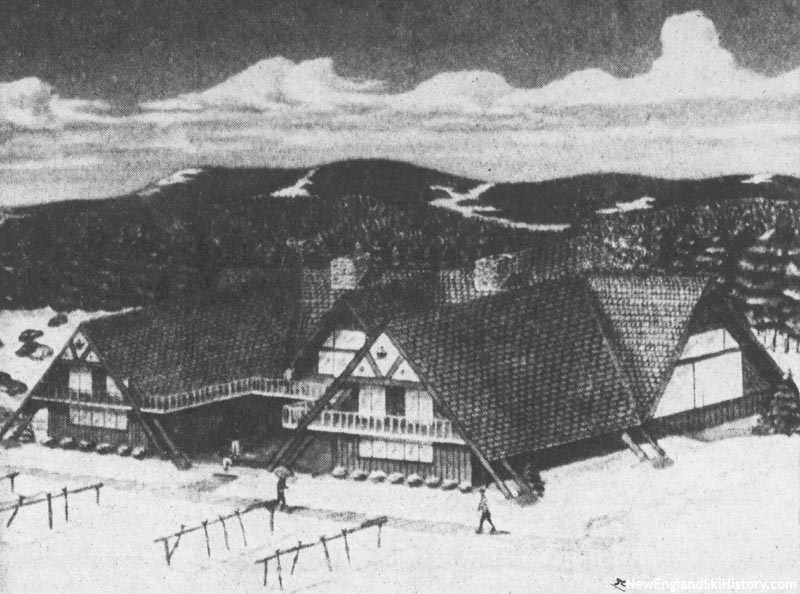
A 1968 rendering of the new base lodge |
Pat's Peak owners Joe and Wayne Patenaude broke ground on a $250,000 expansion program in August 1968. The first phase saw the base area relocated downhill, which involved moving the 120-ton base lodge 600 feet downhill and doubling it in size. The double chairlift was extended 700 feet downhill and a new parking lot was constructed adjacent to the base terminal. The advanced Cyclone and novice Zephyr trails were also cut. In addition, the Knight J-Bar was reportedly installed with night lighting and snowmaking. Plans were also announced for a phase two expansion, which would include further additions to the Doug Wilkie-designed lodge, a new novice chairlift, two new trails, a second J-Bar on the Knight slope, and snowmaking to the top of the Knight T-Bar.
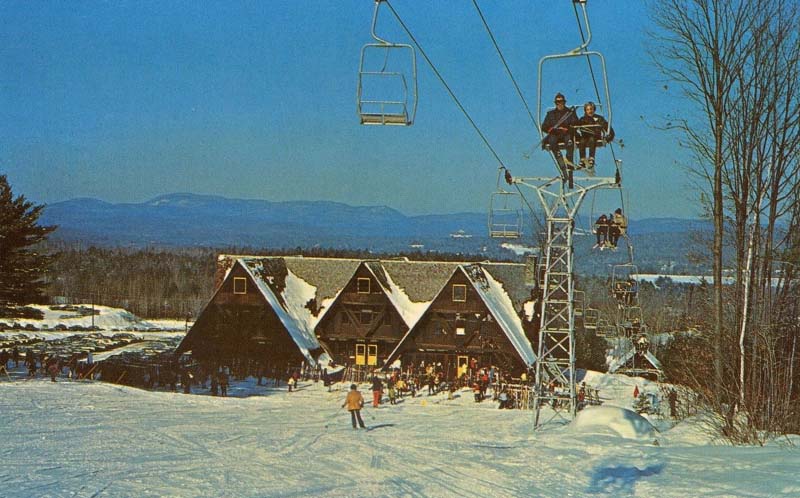
The base area circa the 1970s |
After some untimely wet weather in January, snowpack quickly grew, resulting in base depths of two to four feet in mid-February 1969. By mid-March, Pat's Peak was reporting base depths of four to seven-and-a-half feet, allowing the season to continue through at least the first weekend of April.
The 1970s
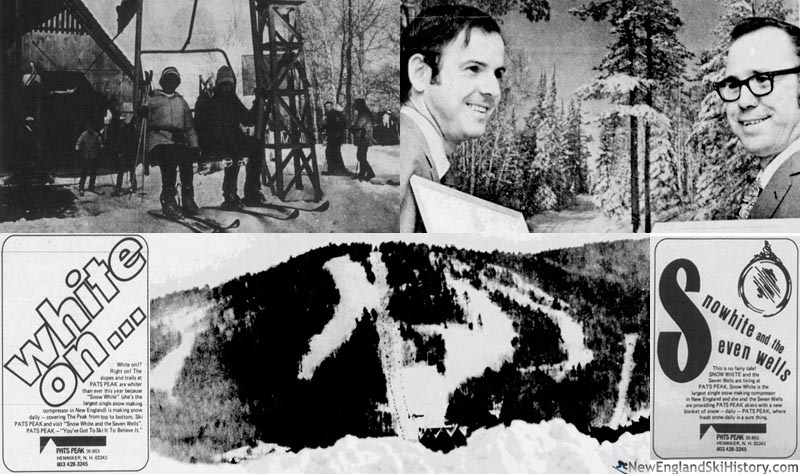
Pats Peak in the early 1970s |
A double chairlift was added to the Valley area for the 1969-70 season as base lodge expansion work continued. Skier visits exceeded 50,000.
For the 1970-71 season, Pats Peak reportedly limited ticket sales to 1,500 per day and was still "experimenting" with snowmaking, according to Joe Patenaude. James Sanderson served as manager. The area increased its racing offerings, including a "national ski racing camp" during Christmas vacation week, a junior racing program with Jim Wolf serving as a full-time coach, and hosting the first "New England Collegiate Cup Races" in conjunction with New England College. The season kicked off in mid-December and was reported as the strongest to date, notching "60,000 to 70,000" skier visits according to the Concord Monitor.
In May 1971, Pats Peak was named "Small Business of the Year" by the New Hampshire Small Business Administration.
The 1971-72 season kicked off in November and had a decent Christmas week, but slumped with a weekend rain pattern in January. Manager James Sanderson lamented in the middle of the month that most of the skiers were season ticket holders. Later that month, Ruedi Wyrsch presented a showing of Warren Miller's "The Sound of Winter" at Pats Peak, featuring a scene with Wyrsch at Pleasant Mountain. Following the screening, Wyrsch organized stunts on the slopes of Pats Peak (but could not participate due to an injury). The season lasted until at least April 1.
In June 1972, an attorney filed a $350,000 federal lawsuit against Pats Peak, claiming he was over-charged by $4 when he was refused a half-day ski rental rate. After making front page news, the attorney's lawsuit was dismissed.
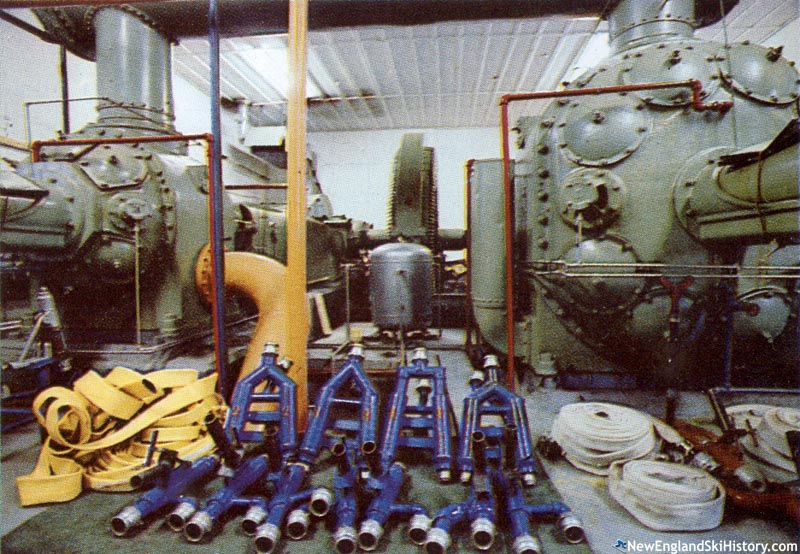
The snowmaking plant circa the 1970s |
After struggling during periods of lean snowfall, Pats Peak installed a large-scale snowmaking system for the 1972-73 season. Covering seven trails and two slopes spanning 55 acres, "Snow White and the Seven Wells" referred to what was then considered the largest air compressor in New England (made in the 1930s and found by Joe in Maine), and the series of wells providing water (likely drilled by Wayne's Contoocook Artesian Well Company). The system likely kicked into gear around Christmas, but was unable to rescue January business due to warm weather, nor was it able to prevent the season from melting away before the middle of March. Nevertheless, when operating, the new snowmaking system made for "delightful skiing," according to general manager James Sanderson.
David Currier was likely named manager of the ski area for the 1973-74 season. The weather struggles continued, as the season kicked off with limited manmade snow just before Christmas. Nevertheless, Pats Peak remained in operation that winter when many other areas were bare. Featuring top-to-bottom coverage while many other areas were idle, Pats Peak hosted the United States National Slalom Championships on February 22 and 23, which were won by future Olympians Cary Adgate and Susan Patterson.
Thanks to snowmaking, Pats Peak operated 75 days during the 1973-74 season. Though not in financial trouble, David Currier said "poor is the word for the financial picture," as the area considered seeking Small Business Administration loans to get through the off-season.
Continuing to be a prominent venue for racing, Pats Peak held one of only two nationally-sanctioned races in New Hampshire during the 1974-75 season. Olympian Dave Currier won the men's slalom, while future US Ski Team member Tiania Tutt won the women's division. Former Pats Peak Ski Club member and future Olympian Holly Flanders came in third.
Despite subpar snowfall yet again, Pats Peak enjoyed a strong 1974-75 season. Manager David Currier told the Concord Monitor, "There didn't appear to be any effect of recession or high gas prices, except a continuation of more weekday skiers, which started last winter."
1975 off-season events included dances and local theatre performances. In November, David Currier and Mike Beebe presented President Gerald Ford with a Monadnock Gold Pass, granting Ford free skiing at Pats Peak, Temple, Crotched, Onset, and Fitzwilliam during his 1976 primary campaign.
The Pats Peak Ski Academy was launched for the 1975-76 season, initially providing racers with nine weeks of daily training. David Currier served as headmaster, while academic tutoring was initially provided by New England College faculty. The program subsequent grew and included a partnership with New Hampton School starting in 1977. Meanwhile, Pats Peak began marketing night skiing on Fridays, coupling it with NASTAR racing and family buffet dinners.
The 1975-76 season likely started during the first weekend of December, skiing on limited terrain for the first few weeks of the month due to warm weather and heavy rain. Christmas week was set up with two snowstorms, however subsequent rain held down attendance. Late January rain led to multiple days of closure heading into February. Business plunged during the second half of February, as warm, rainy weather wrapped up the month. March arrived with multiple snow storms, allowing the season to extend through the end of the month.
Pats Peak hosted the first annual New Hampshire Folk Festival in August 1976, drawing 1,500 attendees.
The 1976-77 season started in early December, with timely natural snow boosting Christmas week business and opening three trails from the summit. The Sunday of New Year's weekend saw 1,800 skiers, with David Currier telling the Concord Monitor, "We've been quite satisfied with the turnouts. We've had a good response mainly because we're close to Boston. We're really the first major ski area heading north. Instead of going north for limited skiing, people were coming here for limited skiing."
Pats Peak hosted the Farah Canadian American Ski Trophy Series in January 1977, with future Olympian Heidi Preuss wining the women's slalom. Meanwhile, Pats Peak's school programs were also gaining attention. Ski school director David Chapman estimated that 1,500 students from thirty-two schools were enrolled in six-week lesson programs. Chapman told the Concord Monitor, "We like to present skiing as a sport that they can do all their lives - not a team sport but for their own recreation."

The Hurricane Triple circa the late 1970s or early 1980s |
Pats Peak installed one of the state's first triple chairlifts for the 1978-79 season, further boosting its status. The Borvig would become the main lift of the ski area for the next four decades. In addition to the lift, the Valley Lodge was constructed and parking expanded. The new lift debuted in late December. On the Monday of New Year's weekend, Pats Peak drew a record 2,800 skiers.
The Co-Ho-We-He camp for girls was created and hosted at Pats Peak during the summer of 1978. The name was derived from the towns of Contoocook, Hopkinton, Warner, and Henniker. Pats Peak also continued to host concerts, such as the New Hampshire Folk Festival and a show by country singer Jeannie C. Riley.
In a fall 1978 interview with the Concord Monitor, general manager David Currier stated that Pats Peak's skier visits had doubled in six years, but that energy and insurance costs were growing faster, adding, "we run a four month business with 12 months of overhead. My overhead is astronomical."
The 1978-79 season started on the lower mountain during the first weekend of December. December "started off like gangbusters," according to David Currier, but New Year's Day was ruined with a thaw, portending a January plagued with rain. Warm weather resulted in the season ending just after the start of calendar spring with the ski area scrambling to accommodate six-week after-school programs that had been postponed multiple times due to poor January weather. According to Currier, "All our snow came at the wrong time, and a lot of it was in mixed precipitation."
In December 1979, Pats Peak hosted a fundraiser for presidential candidate George H. W. Bush. The 1979-80 season likely started in mid-December on one trail.
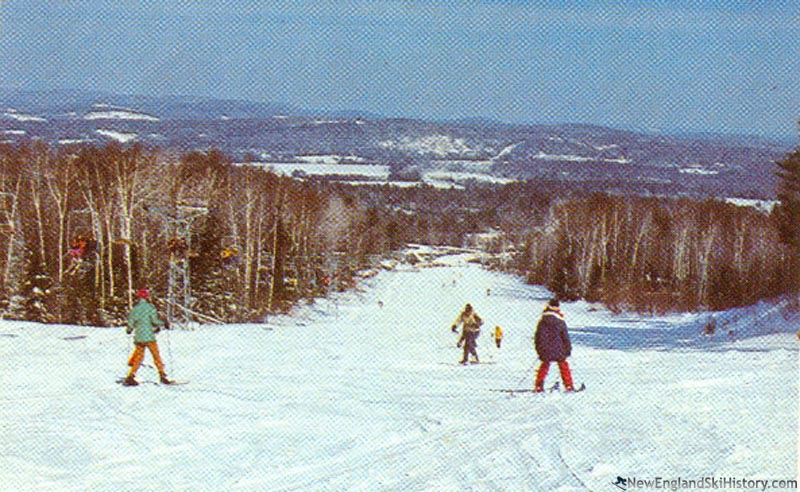
The Valley Area in the early 1970s |
While many other areas shut down in the 1970s and 1980s, Pats Peak chugged along. Not only was it a regional racing destination, but it also hosted school programs with an estimated 5,000 children in 1986.
Base area improvements were made for 1987-88, as Pats Peak celebrated its 25th anniversary season. Base area projects continued for the 1988-89 season, as well as improvements to the Zephyr trail and the learn to ski slope. The Valley double received a new drive terminal for the 1989-90 season, while other trails were widened to improve skier capacity.
Lights were added to the Cyclone trail for the 1993-94 season, followed by Breeze for the 1995-96 season.
Lift and Base Area Improvements
As the mid 1990s arrived, Kris Blomback was promoted to general manager. Blomback later told SkyTrac, "first and foremost I consider myself a caretaker of this facility and want to make sure I leave it like a Boy Scout - better than I found it."
Snow tubing was added for the 1997-98 season, while a J-Bar was relocated from the recently closed King Ridge. The following year, a double chairlift was purchased from the recently closed Norwich University ski area and installed on the main mountain, providing racers and experts with a short, fast ride.
By the turn of the millennium, Pats Peak had grown its learn to ski program to serve more than 8,000 children each season. The night lighting system had been replaced, chairlift drives upgraded, and snowmaking system optimized to put out more snow with less energy consumption and labor. Also around the turn of the millennium, glades were cut over a multi-year period off Hurricane, Zephyr, FIS Race Trail, and Puff.Snowmaking and lighting was installed on Zephyr for the 2001-02 season, improving night skiing for novices.
Pats Peak announced a massive five year base area expansion in 2002, including an additional 8,000 square feet of lodge space. The improvements helped the area to become a popular location for off season banquets and weddings. The 2002-03 season also saw the debut of the Saturday night Pay One Price ("POP") program, bundling a lift ticket, rentals, lessons, and snowtubing for $21.
Pats Peak's second triple chairlift was installed for the 2003-04 season. Named Turbulence, the Partek-Borvig triple chairlift took some stress off the Valley Double. Meanwhile, the snowmaking system was gradually improved, allowing Pats Peak to consistently be amongst the first areas in the region to operate each season, as well as to get 100% of its terrain open.
Lights were added to Blast for the 2004-05 season, which, coupled with the Zephyr addition three years prior, provided a continuous top to bottom run for beginners at night.
Pats Peak established itself as a go-to for bump skiers in 2006-07, when it installed lights and a new snowmaking system on the Hurricane trail. The fully-automatic SMI fan gun installation was the first of its type in New England, allowing for frequent resurfacing of the moguls. Night skiing was added to the adjacent Vortex trail the following season.
Cascade Basin
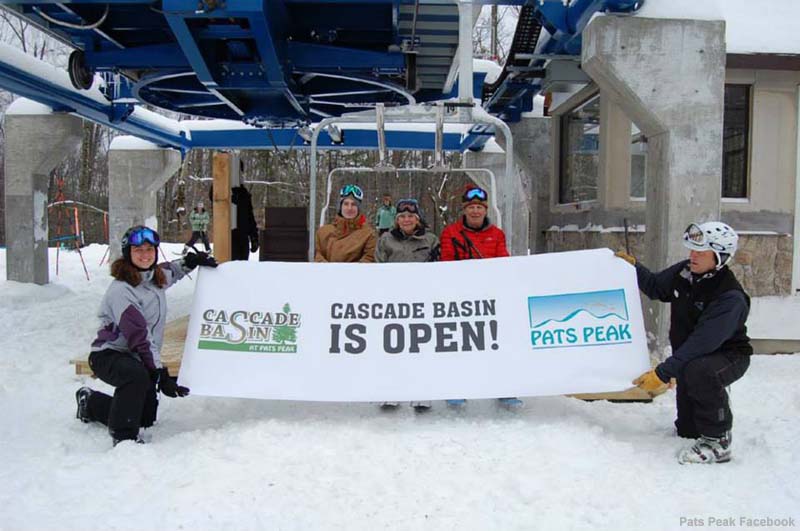
The debut of Cascade Basin on December 19, 2013 |
The Backdraft trail debuted for the 2012-2013, previewing development of the new $1 million Cascade Basin area. The new isolated trail pod opened on December 19, 2013, featuring a triple chairlift and new intermediate terrain. Two more trails were added to Cascade Basin for the 2014-15 season, providing terrain for all abilities.
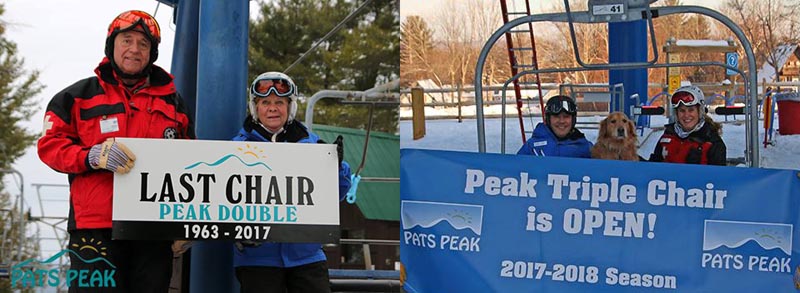
The final day of the Peak Double and debut of the Peak Triple (2017) |
In late spring 2014, Pats Peak purchased and removed the remaining lifts at Ascutney, VT, retaining the Snowdance Triple. Three years later, the lift was refurbished, upgraded, and installed as a replacement to the original Peak Double. Meanwhile, a long term main lodge expansion continued, as well as the installation of additional snowmaking equipment.
NewEnglandSkiConditions.com Reports
| Month |
Average Percent of Terrain Open |
| November | 15% (1 report) |  | | December | 53% (71 reports) |  | | January | 94% (86 reports) |  | | February | 100% (61 reports) |  | | March | 95% (48 reports) |  |
|
| Recent Conditions Reports |
 | Mar. 28, 2025 by liftnerd
Spring Snow, Bare Spots |
 | Mar. 22, 2025 by nordicgal
Loose Granular, Spring Snow |
 | Mar. 14, 2025 by nordicgal
Spring Snow, Variable Conditions |
 | Mar. 13, 2025 by nordicgal
Spring Snow, Loose Granular |
 | Mar. 13, 2025 by beccam
Corn, Corn |
|
|
| Pats Peak on NewEnglandSkiConditions.com |
NewEnglandSkiIndustry.com News
| Recent Articles |
| July 2025 Lift Construction Roundup - Jul. 27, 2025 | | June 2025 Lift Construction Roundup - Jun. 29, 2025 | | Pats Peak to Install Quad Chairlift - Feb. 23, 2025 | | Lift Construction Kicks Off as Future Projects Go Through Permitting - Apr. 27, 2024 | | Pats Peak First Ski Area 100% Open This Year - Jan. 7, 2024 | | Lift Construction Continues as October Arrives - Oct. 1, 2017 | | Summer Lift Construction Continues in New England - Aug. 9, 2017 | | Lift Construction Projects Already Underway - Apr. 9, 2017 | | Lift Construction Continues into New Year - Jan. 6, 2017 | | Multiple Ski Areas Now 100% Open - Jan. 19, 2016 | | Pats Peak NewEnglandSkiIndustry.com News Page |
Expansion History
Image Gallery
Lifts
Click on lift name for information and photos
Maps
Year by Year History
Adult Weekend Full Day Lift Ticket; Adult Full Price Unlimited Season Pass. Window price, including RFID fee and taxes when known.
| 2020s |
Ticket Price |
Season Pass Price |
Pass Payback |
Opening Day |
Closing Day |
Skier Visits |
| 2024-25 | $104.00 |  | $639.00 |  | 6.1 days | December 6 | March 28 | |  | | | 2023-24 | $95.00 |  | $689.00 |  | 7.3 days | December 1 | March 23 | |  | | | 2022-23 | $92.00 |  | $589.00 |  | 6.4 days | December 2 | March 26 | |  | | | 2021-22 | $79.00 |  | $569.00 |  | 7.2 days | December 3 | March 27 | |  | | | 2020-21 | $79.00 |  | |  | | December 11 | March 27 | |  | | | 2019-20 | $75.00 |  | $559.00 |  | 7.5 days | November 29 | March 15 | |  | |
| 2010s |
Ticket Price |
Season Pass Price |
Pass Payback |
Opening Day |
Closing Day |
Skier Visits |
| 2018-19 | $72.00 |  | $559.00 |  | 7.8 days | November 23 | March 31 | |  | | | 2017-18 | $70.00 |  | $549.00 |  | 7.8 days | December 2 | April 1 | |  | | | 2016-17 | $68.00 |  | $549.00 |  | 8.1 days | December 10 | March 26 | |  | | | 2015-16 | $66.00 |  | $539.00 |  | 8.2 days | December 5 | March 27 | |  | | | 2014-15 | $64.00 |  | $529.00 |  | 8.3 days | November 22 | March 29 | |  | | | 2013-14 | $62.00 |  | $519.00 |  | 8.4 days | November 30 | March 30 | |  | | | 2012-13 | $60.00 |  | $499.00 |  | 8.3 days | November 30 | March 31 | |  | | | 2011-12 | $58.00 |  | $469.00 |  | 8.1 days | December 17 | March 23 | 160,000 |  | | | 2010-11 | $56.00 |  | $449.00 |  | 8.0 days | November 27 | March 27 | 160,000 |  | | | 2009-10 | $54.00 |  | $429.00 |  | 7.9 days | December 11 | March 28 | |  | |
| 2000s |
Ticket Price |
Season Pass Price |
Pass Payback |
Opening Day |
Closing Day |
Skier Visits |
| 2008-09 | $52.00 |  | $419.00 |  | 8.1 days | November 22 | March 28 | |  | | | 2007-08 | $49.00 |  | $389.00 |  | 7.9 days | December 1 | April 6 | |  | | | 2006-07 | $48.00 |  | $369.00 |  | 7.7 days | December 9 | March 25 | |  | | | 2005-06 | $47.00 |  | $349.00 |  | 7.4 days | November 26 | March 26 | 150,000 |  | | | 2004-05 | $43.00 |  | $349.00 |  | 8.1 days | December 11 | March 27 | 146,000 |  | | | 2003-04 | $42.00 |  | $349.00 |  | 8.3 days | December 6 | March 28 | |  | | | 2002-03 | $40.00 |  | $495.00 |  | 12.4 days | December 7 | March 30 | |  | | | 2001-02 | $40.00 |  | $495.00 |  | 12.4 days | December 21 | March 17 | |  | | | 2000-01 | $39.00 |  | |  | | December 9 | April 1 | |  | | | 1999-00 | $39.00 |  | $495.00 |  | 12.7 days | December 22 | March 26 | |  | |
| 1990s |
Ticket Price |
Season Pass Price |
Pass Payback |
Opening Day |
Closing Day |
Skier Visits |
| 1998-99 | $38.00 |  | |  | | December 19 | March 28 | |  | | | 1997-98 | $36.00 |  | |  | | December 13 | March 29 | |  | | | 1996-97 | |  | |  | | December 14 | March 30 | |  | | | 1995-96 | |  | |  | | December 9 | March 31 | |  | | | 1994-95 | $33.00 |  | |  | | | March 19 | |  | | | 1993-94 | |  | |  | | | March 27 | |  | | | 1992-93 | $28.00 |  | |  | | | | |  | | | 1991-92 | $28.00 |  | |  | | December 7 | | |  | | | 1990-91 | $28.00 |  | |  | | | March 10 | |  | | | 1989-90 | $25.00 |  | |  | | | | |  | |
| 1980s |
Ticket Price |
Season Pass Price |
Pass Payback |
Opening Day |
Closing Day |
Skier Visits |
| 1988-89 | $24.00 |  | |  | | | March 19 | |  | | | 1987-88 | $22.00 |  | |  | | December 19 | | |  | | | 1986-87 | $20.00 |  | |  | | | | |  | | | 1985-86 | $19.00 |  | $280.00 |  | 14.7 days | | | |  | | | 1984-85 | $18.00 |  | $265.00 |  | 14.7 days | | | |  | | | 1983-84 | $17.00 |  | $250.00 |  | 14.7 days | | | |  | | | 1982-83 | $17.00 |  | |  | | | | |  | | | 1981-82 | $16.00 |  | |  | | | | |  | | | 1980-81 | $15.00 |  | |  | | | | |  | | | 1979-80 | $12.00 |  | |  | | December 15 | | |  | |
| 1970s |
Ticket Price |
Season Pass Price |
Pass Payback |
Opening Day |
Closing Day |
Skier Visits |
| 1978-79 | $12.00 |  | |  | | December 2 | March 24 | |  | | | 1977-78 | $11.00 |  | $150.00 |  | 13.6 days | December 10 | March 26 | |  | | | 1976-77 | $11.00 |  | $150.00 |  | 13.6 days | December 4 | March 27 | |  | | | 1975-76 | $10.00 |  | |  | | December 6 | March 28 | |  | | | 1974-75 | $10.00 |  | |  | | November 29 | March 30 | |  | | | 1973-74 | $9.00 |  | |  | | December 22 | March 24 | |  | | | 1972-73 | $9.00 |  | |  | | December 2 | March 11 | |  | | | 1971-72 | $8.00 |  | |  | | November 27 | | |  | | | 1970-71 | $8.00 |  | |  | | December 17 | April 4 | |  | | | 1969-70 | $7.00 |  | |  | | | March 29 | |  | |
| 1960s |
Ticket Price |
Season Pass Price |
Pass Payback |
Opening Day |
Closing Day |
Skier Visits |
| 1968-69 | $6.00 |  | $75.00 |  | 12.5 days | | April 6 | |  | | | 1967-68 | $5.50 |  | |  | | November 18 | | |  | | | 1966-67 | |  | |  | | December 15 | | |  | | | 1963-64 | $5.00 |  | $65.00 |  | 13.0 days | December 13 | | |  | | | 1962-63 | $5.00 |  | $65.00 |  | 13.0 days | January 5 | | |  | |
Visitor Memories
| "I love working at Pats Peak. I love it so much I am beginning my 25th season as the Peak celebrates its 60th this year." | | Bruce Lavoy, Nov. 7, 2022 | | "I worked for Pat's Peak for 12 straight years in the kitchen. To this day, it's the best job I ever had. Made a ton of friends from the exchange student program. Miss working there every day." | | Brandon McIlvene, Dec. 27, 2019 | | "I joined the Pat's Peak Ski Patrol as a volunteer in 1980 and retired 25 years later. I learned so much about skiing, first aid and community service during my career! My son grew up from nursery to racing and we made many wonderful lifetime friends.
" | | Judith Nicholson, Dec. 26, 2019 | | "As a hometown resident....when Pat's Peak was first developed, we learned to ski there and spent many, many hours on all the slopes. We were blessed to have this area so near and so reasonably priced. Many memories." | | Gail Crane, Dec. 20, 2019 | | "I went to Academy at the peak and later on started my ski instruction career at the peak, this place is near and dear to me" | | Olga Spanhoff, Mar. 14, 2017 | | "Had the privilege to start my coaching career at the Peak with a fabulous group of adults and kids. I remember working with Olga, I trust al is well with you." | | Terry Leonard, May. 8, 2015 | | "i spent a few of my winters there going to a awesome small racing academy and getting great coaching from some of the best I love the Peak" | | olga spanhoff, Jan. 10, 2014 |
|
External Links
Pats Peak - official site
|
Last updated: January 28, 2025
|



